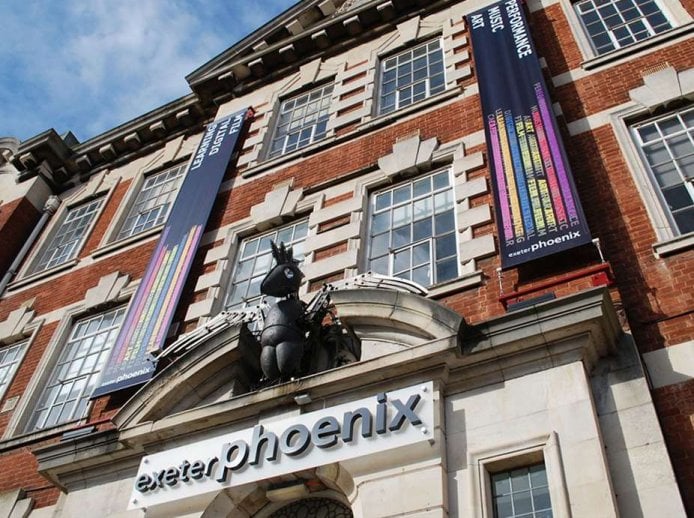
The power of shared ambition
A unified view of audience behaviour has increased sales and donations for Exeter Phoenix. Alice Young explains how.
Invisible walls between marketing, box office and fundraising can lead to missed sales and lost donations. One venue uniting its revenue-generation teams under one strategy is Exeter Phoenix, part of a leading group of arts organisations that is building shared ambition around audience development, with increased attendance, revenues and individual-giving the result.
“Donations have almost doubled with the new segmentation and a fundraising appeal we designed informed by the new strategy”
Located in the heart of Exeter, Exeter Phoenix is a multi-artform venue including art galleries, a theatre, cinema, live music venues, film production resources, a radio station, print workshop recording studios and a café bar. As well as hosting hundreds of music, film, art and performance events every year, the venue supports a thriving local arts scene with resources for emerging artists, musicians, theatre companies, writers and filmmakers.
With such a varied programme and audience, defining customer segments with shared attributes would be a challenge for either marketing or fundraising. Creating segments that correlated customer behaviours and preferences in ways that could benefit both revenue realms might seem too big an ask. That’s where a comprehensive view of audience data and sales analytics play their part.
Shared strategy and ambition
In late 2016 the venue’s marketing and fundraising teams realised that too many opportunities to grow sales and make a charitable ask were being missed at the time of booking. They decided to create a cross-functional strategy for audience development that would benefit the organisation as a whole.
Dettie Ellerby, Marketing and Press manager, said: “We were inspired by the Smashing the Silos presentation at the Spektrix conference 2016. It sparked some very interesting discussions between marketing, fundraising and box office teams. We were all noting changes in customer attitudes, booking patterns and individual donations, but it was hard to correlate them – especially across all the different genres and types of events we put on.
“We realised that if we were going to act on what we were all learning separately, we needed a systematic way to talk about customers and a better way to share information.”
As a first step they organised a fortnightly development meeting between fundraising, box office and marketing to talk about sales patterns and any trends or changes each group had picked up on in the previous two weeks.
The second step was to analyse their audience data holistically, to understand all the ways customers interacted with the venue and where the commonalities were around spending and giving, genre preference, attendance, incremental sales, total amount of spend and seasonal variations.
Exeter Phoenix has been using the Spektrix box office management system since 2012. Its analytics capabilities provided the data-backed proof that customers were coalescing into new groupings, and that these had certain shared behaviours and propensities. With the right offers and tailored communication approach, that information could enable the venue to secure additional sales and donations.
Segmentation scheme
From its review of the data, Exeter Phoenix created a new segmentation scheme based on the attributes of four major customer groups:
- Non-attenders: Individuals in the local area who have simply not been aware of or engaged with the venue’s programme.
- Low-level engagers: Individuals who have attended a performance or event once in the past two years.
- Frequent bookers: People who have attended two or more events in the past three years.
- Advocate prospects: People attending three or more events in the past 12 months.
They then considered the points where each group interacts with the venue and what their unique needs and expectations were. From this a series of targeted communications, offers and campaigns for both marketing and fundraising key performance indicators (KPIs) were created.
Once the new strategy had been defined, Ellerby and her colleagues presented it to the wider team to secure everyone’s buy-in, from the top of the organisation through to casual staff members. They wanted everyone to develop an awareness of these groups and capture ongoing information – whether at the point of sale or anecdotally – to help refine offers and ensure that both fundraising and upselling opportunities were being identified.
The results
One year under the new development strategy, Exeter Phoenix has grown attendance and donations, while setting the stage for more effective marketing campaigns.
There has also been movement through the sales funnel, as many non-attenders have made their first visit and become low-level engagers. A fifth category of lapsed attender has also been identified for action. The venue’s mailing list is growing in both volume and quality as more and more people update their information and opt in to additional communications.
“Donations have almost doubled with the new segmentation and a fundraising appeal we designed informed by the new strategy,” adds Dettie Ellerby. “Attendance is up overall – including one exceptional month with 170% year-on-year growth. People are much more aware of our charitable status and our frequent bookers segment is growing fastest of all four.
“Having the data and reporting capability to see customers from the perspective of attendance, purchase history, charitable giving, genre preference and even the times and days when they are most likely to book was hugely important. It gave us the proof we needed to convince everyone that the new strategy was sound, and that change was needed. Now we are seeing the results.”
Alice Young is UK Managing Director at Spektrix.
www.spektrix.com
This article is an advertising feature sponsored and contributed by Spektrix.

Join the Discussion
You must be logged in to post a comment.